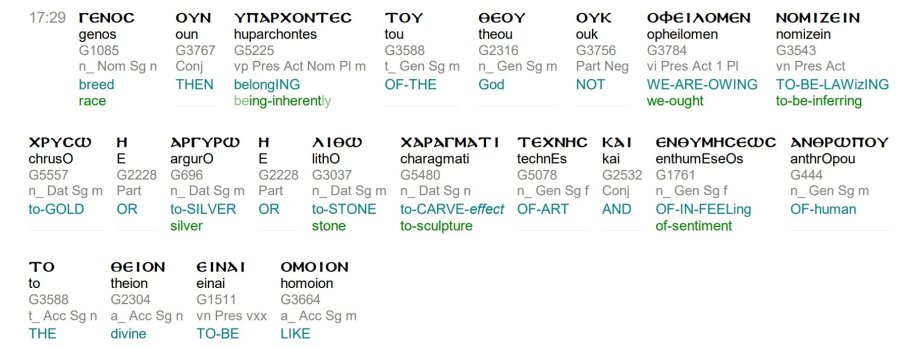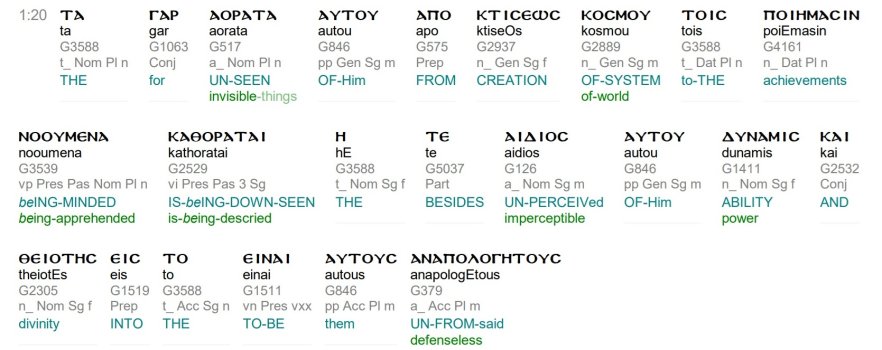Wouldn't say so
@Keiw
1. Acts 17:29
"Forasmuch then as we are the offspring of God, we ought not to think that the Godhead is like unto gold, or silver, or stone, graven by art and man's device."
Greek Word: θεῖον (theion)
Meaning: The term θεῖον (theion) can be translated as "divine nature" or "divinity." It denotes the essence or nature of the divine.
Exegesis: In this verse, Paul is addressing the people of Athens at the Areopagus. He argues that, since humans are the offspring of God, it is illogical to think of the divine nature (the Godhead) as something material like gold, silver, or stone crafted by human hands. Theion emphasizes the sacred and spiritual nature of God, contrasting it with lifeless idols.
2. Romans 1:20
"For the invisible things of him from the creation of the world are clearly seen, being understood by the things that are made, even his eternal power and Godhead; so that they are without excuse."
Greek Word: θειότης (theiotēs)
Meaning: The word θειότης (theiotēs) is translated as "divine nature" or "divinity." It refers to the inherent attributes and qualities that belong to God.
Exegesis: Paul asserts that God's invisible attributes, such as His eternal power and divine nature (theiotēs), have been clearly perceived in the creation of the world. This visible manifestation of God's power and divinity leaves humanity without excuse for not acknowledging Him. Theiotēs here underscores the clear evidence of God's existence and nature through the created order.
3. Colossians 2:9
"For in him dwelleth all the fulness of the Godhead bodily."
Greek Word: θεότης (theotēs)
Meaning: The term θεότης (theotēs) is more specifically translated as "deity" or "godhead," referring to the totality of divine essence and power.
Exegesis: Paul emphasizes that all the fullness of deity (theotēs) dwells in Christ bodily. This asserts the complete and perfect nature of divinity in Jesus Christ. Theotēs highlights that Jesus is fully God, possessing the entire divine essence, not just a portion or aspect of it. This is a critical affirmation of the doctrine of the Incarnation, indicating that Jesus is fully and truly God in bodily form.
Summary and Theological Implications
The three Greek terms used for "Godhead" in the New Testament — θεῖον (theion), θειότης (theiotēs), and θεότης (theotēs) — all emphasize different aspects of the divine nature. Together, they provide a comprehensive understanding of the concept of God's essence and attributes:
Theion (Acts 17:29) highlights the sacred and spiritual nature of God, contrasting it with material idols.
Theiotēs (Romans 1:20) refers to the visible evidence of God's eternal power and divine nature in creation.
Theotēs (Colossians 2:9) affirms the complete and perfect presence of divine essence in Jesus Christ.
Addressing the Concept of the Godhead
The term "Godhead" is used to describe the totality of God's divine nature and essence, encompassing all attributes that constitute deity. This understanding aligns with the orthodox Christian doctrine of the Trinity, which holds that the one God exists in three persons: Father, Son, and Holy Spirit. Each person of the Trinity is fully and equally God, sharing the same divine nature.
Thus, there is no denial of the Godhead within the framework of orthodox Christian theology. Instead, the Godhead is affirmed as the fullness of divinity shared among the Father, the Son, and the Holy Spirit. This triune understanding of God is foundational to Christian belief and is supported by the scriptural references and the usage of the Greek terms discussed above.
Copilot
Johann.






